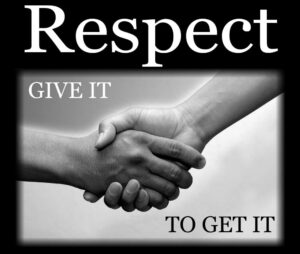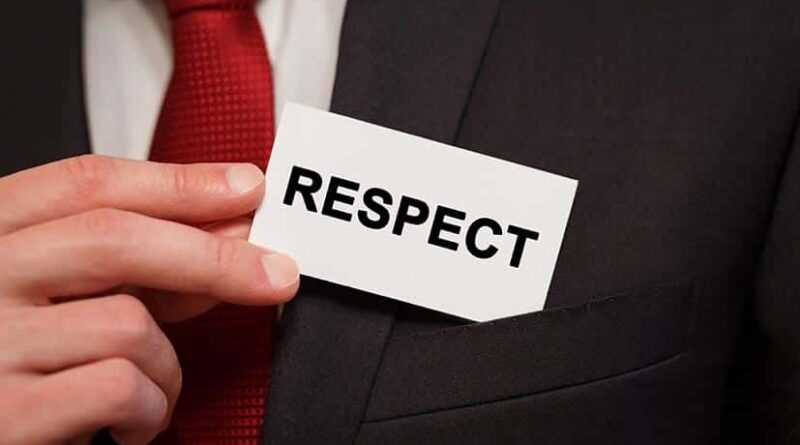RESPECT: ONE VALUE TO WIN THEM All
Respect is a fundamental attitude that honours the worth and dignity of individuals, groups, or entities. It involves treating others with consideration, courtesy, and recognition of their inherent rights and humanity. Respect is crucial in personal relationships, work environments, and society. Respect forms the foundation for healthy interactions in personal relationships, fostering trust and mutual understanding. In work environments, respect promotes collaboration, teamwork, and productivity. In society, respect is the cornerstone of harmonious coexistence among individuals from different backgrounds, cultures, and beliefs. It forms the basis for laws, policies, and social norms that uphold equality and justice. Respecting diversity leads to social cohesion and collective progress.
The importance of respect
Respect encourages diversity, inclusion, equity, empathy, and social responsibility by valuing differences, providing equal opportunities, and challenging bias. It instils a sense of belonging, removes barriers to participation, addresses systemic inequalities, and cultivates empathy. It also encourages dialogue, mutual respect, and understanding among people from various backgrounds, building bridges across differences, and promoting social responsibility.

Fostering positive relationships:
Respectful communication fosters understanding, empathy, and open-mindedness, reducing misunderstandings and conflicts. It encourages empathy, fostering deeper connections and trust. Respect promotes equality and fairness, treating everyone equally, regardless of status, background, or beliefs. This fosters intimacy, trust, and support, fostering a sense of value and respect for all.
Building trust:
To build trust, respectful behaviour entails being dependable, honest, and confidential. It fosters a psychologically safe environment, allowing open communication and collaboration. Respectful conflict resolution entails addressing disagreements with empathy and understanding while maintaining trust and strengthening relationships. This approach encourages open communication and collaboration, thereby building trust among community members.
Maintaining harmony in communities:
Respect promotes social cohesion by encouraging unity and solidarity among community members, emphasizing shared values and diversity. It reduces discrimination and prejudice by encouraging acceptance and understanding of differences. Respect promotes collective responsibility by encouraging people to consider the impact of their actions on others and accept responsibility for promoting positive social norms. This promotes accountability and shared responsibility for community harmony.
Benefits of practicing respect
Respect encourages open communication, empathy, and understanding, thereby creating a collaborative environment for conflict resolution. It promotes compromise and collaboration, addressing underlying issues while maintaining relationships. It also promotes calm interactions and de-escalation techniques, which help to prevent violence from breaking out. Individuals who develop empathy and understanding can find creative solutions and maintain relationships, ultimately fostering reconciliation and minimizing harm.
Practicing respect yields numerous benefits on both individual and societal levels, fostering positive interactions, collaboration, and harmony.
Individual level:
Respectful interaction promotes attentiveness, clear expression, and comprehension, resulting in fewer misunderstandings and stronger relationships. It promotes trust, empathy, and mutual understanding in relationships, which boosts self-esteem and confidence. Respectful behavior also fosters empathy and compassion for others, resulting in a stronger sense of connection and a willingness to help those in need.
Societal level:
Respect increases social cohesion, diversity, inclusion, and effective conflict resolution. It promotes community unity, lowers tensions, and prevents violence. Respectful societies value positive dialogue, empathy, and understanding, which leads to peaceful conflict resolution. They also advocate for social justice by removing systemic barriers and inequalities and promoting fairness, justice, and equal opportunities for all.
Building respect;
Practice empathy:
To interact effectively, you must comprehend others’ viewpoints, thoughts, and experiences, listen attentively, validate emotions without judgment, and provide compassion and support, especially during difficult times.
Practice active listening:
Maintain eye contact and nod while speaking to demonstrate comprehension, refrain from interrupting or formulating comments, and think about what you’ve heard to ensure your full involvement.
Promote inclusivity:
Celebrate diversity by welcoming people with different origins, and cultures. Create welcoming environments where everyone feels welcome and valued, and confront racist language and behavior in your community or workplace.
Practice conflict resolution skills:
To resolve disagreements, keep a cool and respectful approach, focus on finding solutions rather than assigning blame, utilize “I” words instead of blaming or criticizing others, and seek tolerance and collaboration for positive results.
Conclusion
In essence, respect is a fundamental attitude that honors the worth and dignity of individuals, groups, or entities. It is crucial in personal relationships, work environments, and society, fostering trust, mutual understanding, and harmonious coexistence. Respect encourages diversity, inclusion, equity, empathy, and social responsibility by valuing differences, providing equal opportunities, and challenging bias. It fosters positive relationships, builds trust, and maintains harmony in communities. Practicing respect yields numerous benefits on both individual and societal levels, promoting positive interactions, collaboration, and harmony. Building respect involves empathy, active listening, inclusivity, and conflict-resolution skills.
Content Credit / Ajibola Emmanuel Adebayo
Picture Credit / https://www.vectorhealth.com.au/respect-word-often-used-often-truly-acted/
https://www.linkedin.com/pulse/how-respect-yourself-others-joseph-mandour




